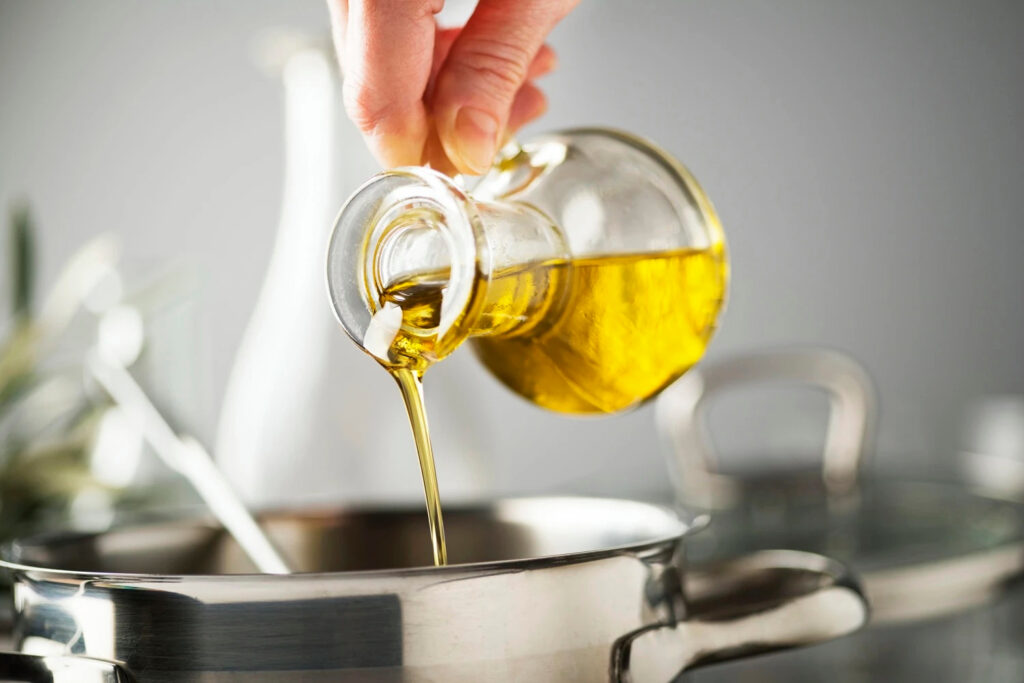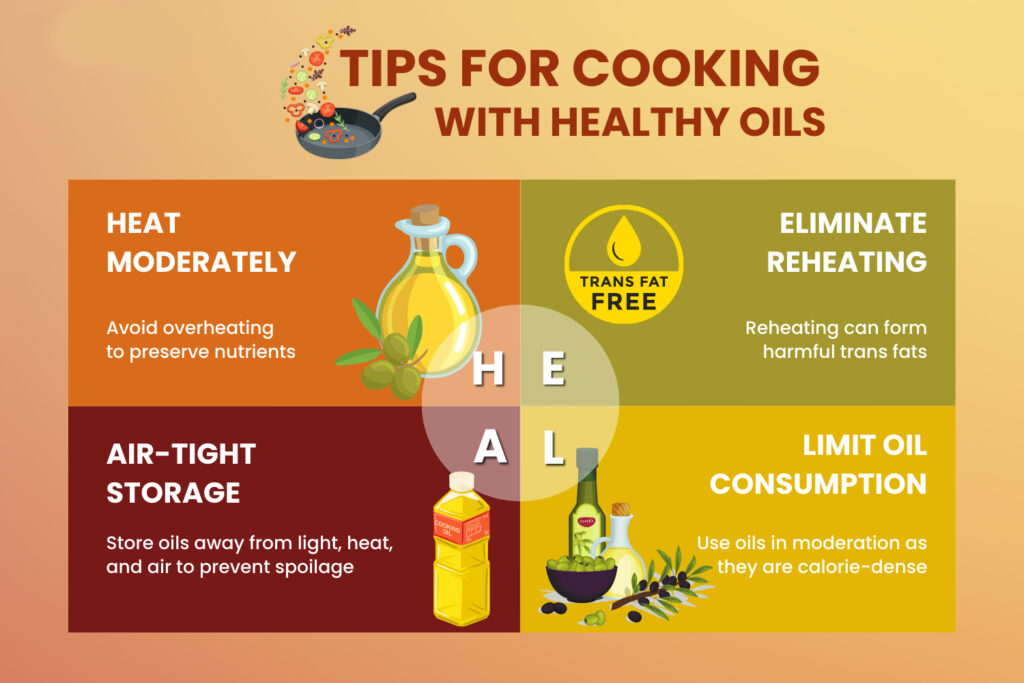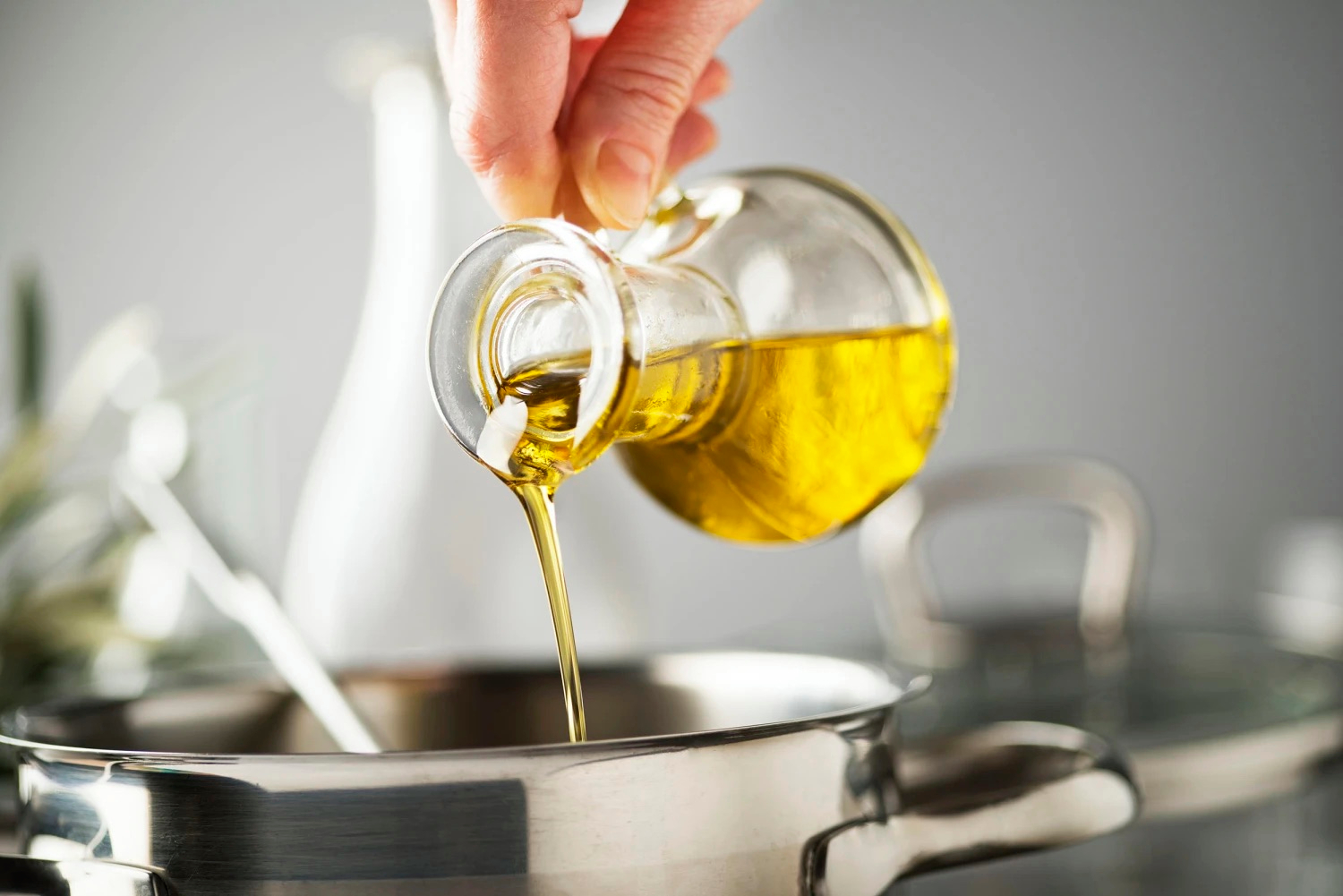Eating well plays a vital role in maintaining a strong heart, and choosing the right cooking oil can make a significant difference. Moreover, scientific studies support the use of oils rich in unsaturated fats for cardiovascular benefits. In addition, this article examines various cooking oils, compares their nutritional profiles, and offers practical advice—all while focusing on heart health.

Understanding Cooking Oils and Heart Health
Cooking oils contribute essential fats to your diet and influence cholesterol and inflammation levels. Furthermore, oils differ in their fatty acid composition, which directly affects cardiovascular performance. Consequently, understanding these differences helps you select an oil that supports long-term heart health.
The Role of Fats in Heart Health
Healthy fats assist in nutrient absorption and cellular repair, yet not all fats offer the same benefits. Moreover, unsaturated fats—especially monounsaturated and polyunsaturated fats—help lower bad cholesterol and improve arterial function. Additionally, consuming these fats in place of saturated fats reduces the risk of heart disease.
Types of Cooking Oils
Cooking oils vary widely in their nutritional content and culinary uses. Moreover, some oils provide a rich source of antioxidants while others excel in heat stability. In addition, evaluating each oil’s profile allows you to match the oil to your cooking needs and health goals.
Saturated Fats vs. Unsaturated Fats
Saturated fats tend to raise LDL cholesterol levels and appear in animal fats and certain tropical oils. Conversely, unsaturated fats remain liquid at room temperature and promote a healthier lipid profile. Furthermore, research consistently shows that diets higher in unsaturated fats contribute to reduced cardiovascular risk.
Omega-3 and Omega-6 Fatty Acids
Omega-3 fatty acids actively reduce inflammation and help protect the heart, while omega-6 fats play an important role in cell function. Moreover, maintaining a balanced ratio between these fats is crucial, since excessive omega-6 intake can undermine omega-3 benefits. In addition, selecting oils with an optimal balance supports overall cardiovascular health.
Top Heart-Healthy Cooking Oils
Below are some of the top oils known for their heart-friendly properties:
- Extra-Virgin Olive Oil: Rich in monounsaturated fats and antioxidants, it lowers inflammation and improves cholesterol balance.
- Avocado Oil: Offers a high smoke point and a similar fatty acid profile to olive oil, making it versatile and heart-healthy.
- Canola Oil: Contains a blend of monounsaturated and polyunsaturated fats and delivers small amounts of omega-3 fatty acids.
- Flaxseed Oil: Packed with omega-3s, it benefits heart health when used in cold dishes only.
Scientific Research on Cooking Oils and Heart Health
Numerous studies reveal that unsaturated fats contribute to better cardiovascular outcomes. Moreover, clinical trials have demonstrated that replacing saturated fats with oils high in monounsaturated and polyunsaturated fats reduces the risk of heart disease. In addition, long-term dietary studies show that a Mediterranean-style diet—rich in extra-virgin olive oil—correlates with lower rates of heart attacks and strokes.
Tips for Choosing and Using Cooking Oils
Choose oils that suit your cooking style while protecting heart health. Moreover, consider the oil’s fatty acid profile, smoke point, and flavor when making your selection. In addition, proper storage and moderate use help preserve the oil’s beneficial properties and enhance your overall diet.
The Impact of Cooking Techniques on Oil Health
Cooking techniques directly influence an oil’s nutritional integrity and performance. Furthermore, heating oils above their smoke point may destroy antioxidants and generate harmful compounds. In addition, methods like sautéing, steaming, and roasting help retain the oil’s health benefits while imparting flavor to your food.
Health Considerations and Recommendations
A heart-healthy diet benefits from a balanced intake of unsaturated fats and limited saturated fats. Moreover, nutrition experts recommend replacing butter and lard with oils rich in monounsaturated and polyunsaturated fats. In addition, monitoring portion sizes and integrating a variety of oils ensures you meet nutritional guidelines without overconsumption.
Comparative Analysis of Cooking Oils
Comparing oils reveals differences in composition, flavor, and culinary uses that affect heart health. Moreover, extra-virgin olive oil consistently shows superior antioxidant properties, while avocado oil excels in versatility due to its high smoke point. Additionally, canola oil offers a neutral taste and balanced fats, making it suitable for a range of dishes. In short, evaluating these factors helps you decide which oil best aligns with your dietary goals and cooking habits.
Recommendations for Daily Use
Daily consumption of heart-healthy oils can lead to measurable improvements in cardiovascular markers. Moreover, incorporating a mix of oils—such as olive, avocado, and canola—ensures you receive a range of beneficial fatty acids and antioxidants. In addition, focus on using oils primarily for dressings, light sautéing, and low-heat cooking to preserve their integrity. Thus, by moderating your intake and diversifying your choices, you build a heart-friendly eating pattern.
Future Trends in Cooking Oils and Heart Health
Advances in food technology and nutrition continue to shape the future of cooking oils. Moreover, researchers explore innovative extraction methods that enhance oil stability and nutrient content. In addition, new blends of oils may offer tailored benefits for heart health, such as optimized omega-3 to omega-6 ratios and increased antioxidant levels.

Practical Tips for Incorporating Heart-Healthy Oils
To make heart-healthy oils a staple in your diet, follow these practical suggestions:
- Read Labels: Verify that the oil contains a high percentage of unsaturated fats and minimal additives.
- Experiment: Introduce different oils into your recipes to diversify flavor and nutritional benefits.
- Store Properly: Keep oils in cool, dark places to maintain their quality and extend shelf life.
- Monitor Usage: Use oils in moderation to balance overall fat intake and avoid excess calories.
Additional Considerations for Heart Health
It is essential to view cooking oils as one component of a broader, heart-healthy lifestyle. Moreover, combine oil consumption with a diet rich in fruits, vegetables, whole grains, and lean proteins. In addition, regular physical activity and stress management further support cardiovascular health. Thus, a holistic approach to nutrition and lifestyle yields the best outcomes for your heart.
Culinary Innovations and Heart Health
Recent culinary innovations focus on blending different oils to create products that maximize health benefits and flavor. Moreover, chefs and nutritionists collaborate to develop recipes that integrate heart-healthy oils in creative ways. In addition, emerging trends include using cold-pressed oils in raw dishes to preserve nutrients. Consequently, these innovations promise exciting opportunities for healthier, more flavorful meals.
The choices you make in your kitchen are the first step to a healthier heart. Even the smallest change, like choosing the right oil, can make a big difference.
Michael Pollan
Conclusion
In summary, extra-virgin olive oil, avocado oil, and canola oil emerge as top choices for heart health. Moreover, scientific research supports the benefits of unsaturated fats over saturated fats. In addition, proper cooking techniques and storage methods help maintain the nutritional quality of these oils.

